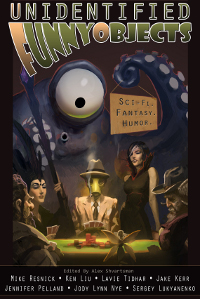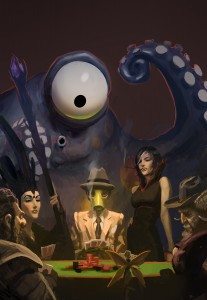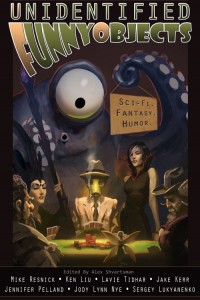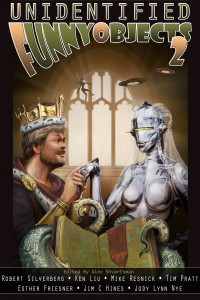Mr. Terwilliger had been most jovial with us for the entire evening, as gentlemen of the Codswallop Social Club always are, but when the snuff-box came his way, he put up a hand and declined.
“Forgive me,” he said, “I come from the future, when we have learned the terrible effects of tobacco upon the tissues.”
Of course we enquired further, but he would not elaborate. Soon our attention was drawn to Mr. Darven discovering, tragically, the club’s out-of-tune piano, and our curiosity was muted by his musical crimes and a few more rounds of port.
The next time we met, however, the occasion revisited my memory, and I mentioned to Mr. T that I seemed to recall him stating clearly that he had “come from the future.”
He laughed. “Did I say that! Ah, what a dreadful lapse. I must have been deep in my cups. Dear friend, you must not let me make such a fool of myself again. This is the very reason I do all of my drinking in private homes!”
I sensed an opportunity, and swore I would do what I could to help him. So I invited him round that evening and went about making him as drunk as possible.
“I really should abstain,” he said, then, “Do top this off, if you will,” then, “I did not imagine I should develop such a taste for port, it’s so damned sweet,” then, “We ought to play a game. A beer-pong game,” then he said, in a slurring drawl, “I love you, maaaan,” and passed out in my armchair.
When he awoke that morning he wandered into the breakfast room, wearing chagrin like a wet hat. “I must thank you,” he said. “Where I’m from they would have drawn upon my face by now with a sharply.” Or perhaps I misheard.
“In the future?” I said pointedly.
He sighed. “Oh, well, hmm. I’ve already trusted you with my person in a state of vulnerability, haven’t I? You seem decent. Not at all dangerous.”
“I beg your pardon,” I said.
“Rational, is what I mean. And loyal, I’d like to think. What I mean to say is, I think if I swore you to a secret, you might keep it.”
“Thank you,” I said, straightening my cravat with a grudging kind of tug. “I rather think I might.”
“I’m from the future,” he said.
I waited eagerly, but that was all.
He fidgeted. “Er, did you hear me? I said I have arrived here from the future.”
“I heard you,” I said. “I heard you two nights ago when you said it originally. I confess I was hoping for details.”
He drew a deep, bracing breath, as if preparing to take exercise — ludicrous as that seemed. “I was born nearly one hundred years from now,” said Mr. T. “I don’t know how I came to be here, only that I have. I’ve taken such pains to build a life here. You can’t imagine. I’m not even British. I’m an American. I’ve only watched a great deal of Torchwood, you see. And Sean of the dead. I can’t tell you. Hundreds of times. Downton Abbey. And all the Harry Potters! I was mad about Harry Potter.”
I arched my eyebrows. “Mad, you say.”
“Forgive me,” he said, beaming like a schoolboy. “It’s incredible to be able to speak words I haven’t in years. Angry birds! Avatar! Come at me, bro! Longcat is lo-o-o-o-ong!”
He raved thus for a few minutes. Every word delighted him. He laughed often. I took the opportunity to call for more tea and another few eggs.
The arrival of the eggs distracted him from his declamations, which had settled into a litany of proper names of all nationalities with occasional commentary. He sat with me and ate. His composure and energy had returned. He remembered an anecdote involving Mr. Darven, a laundress, a side of pork, and three stray cats, and we shared a splendid laugh at their expense. When we had finished, he said:
“I don’t know why I kept my secret so dearly. It’s so liberating. If I’d known what having just one confidante could do for my entire outlook! Instead I’ve spent these years skulking and lying and being simply terrified that someone would discern my secret….”
“You’re lucky to have drunkenly blurted it among friends,” I said kindly. He nodded.
“My name isn’t even Terwilliger. It’s Blotch. What delight I’ve drawn from being referred to familiarly as ‘Mr. T.'”
I said, “I don’t see the humor.”
“You wouldn’t understand. May I describe to you how I came to slip, I may say, through the careless fingers of Father Time?”
I made myself comfortable, gave my breakfast space to stretch its legs. “Please!”
“It was an idle Thursday morning,” he said. “I being without work at the time, and having tired of double-tapping imaginary enemies, I took to the park, where if nothing else I could loiter and watch the college girls.”
“College girls,” I said, and we shared a smile.
“I strolled into a wooded area well past the parking lots when the ground beneath me shook gently. A fog surrounded me, followed by brief darkness: when it stopped, I found myself quite lost. I had no signal. My surroundings and my technology had fled like…like college girls. You know. I wept like a frustrated child.”
I nodded in sympathy.
“Presently I came to a hamlet in the countryside, where my situation showed its face: I had traversed space, if not time, and my immediate priority must be to blend in. I always thought that was a failing of doctor who…” I waited, but he did not finish his sentence. “I stole a suit of clothing and, realizing it would likely be recognized, walked on until I could hail a ride to the next town. Then the next. I became adept at playing the part of a bedraggled fop who had been robbed, been upset in the river, used his map as a raincoat, and so forth; I learned the details of my situation, vis–à–vis time and place, and exercised all my skills at the dine-and-dash.”
“Dine-and-dash!” I chortled. “I shall have to teach that term to Mr. Darven. He’s already a master of the concept.”
“Soon I came to London. What a mad city this is. Still utterly penniless, I located a middle-aged man in what I perceived to be a well-cut suit — but not too well-cut — and remarked that in prior visits I had been to a gentlemen’s club that was dimly lit and fairly large, but not so terrifically posh, just a small bit on the down-and-out side, but dash me, I had forgotten the name — did he know the one I meant? And bless him, he did!”
“The Codswallop!” I cried, snapping my fingers.
“Yes!” he said. “I climbed in through a window. There I could eat, sleep, tend to my person, and steal — and claim to borrow when I was caught. I took the identity of a member who had not visited in years, one Mr. Terwilliger, and for a month I never left. I became very friendly with the staff, or I should never have succeeded. Then, of course, I began making true friends. Friends with estates and money and other friends with the same. Now, thus established, I consider this temporal era my true home, and my birthplace — the future — a strange, distant dream.”
I sat back in my chair, full of egg and wonder. Oh, I had heard plenty of good-natured fibs from the Codswallop type — tall tales out of Africa and the American frontier and the far, frozen poles — but this dwarfed them all. And he seemed so sincere! I was no scientist, but I felt compelled to probe his story for weaknesses. And advantages.
“Very well,” I said. “If you’re from the future you must be dripping with foreknowledge. Who is to be the next mayor of London?”
He said promptly, “I have no idea.”
I frowned. “The Prime Minister.”
“Couldn’t say.”
“Monarch?”
“Dear boy, I couldn’t reliably name the next war.”
“Devil take you!” I cried. “And to think I almost swallowed your time-travel tripe.”
“One moment,” he said, sounding hurt. “Can you name the mayor of Boston from seventeen-humpity-humpity? Or even our first half-dozen American presidents? My knowledge of history is like everyone’s: broad and shallow, with rare pinpoints of specificity. I never realized what vast minutiae are required for daily living, until they were stripped from me. The details you ask for — useful as they would be today — are such footnotes of history that by the time I was dragged through my schooling, they never touched me.”
I said, “Those names you recited?”
“Bread and circuses.”
Daydreams of betting-parlors and stock exchanges fled. I gazed at Mr. T in frank disappointment. “Not a liar, then, but a fool,” I sniffed. “I dare say that isn’t better.”
He nodded glumly.
I twiddled my fork on the empty plate, thinking of opportunities lost, imagining Mr. T as a book with a wonderfully promising title, and blank pages within. What a waste of a time-traveler! I thought, uncharitably. If only Father Time had dropped in a historian instead. Or a scholar of champion race-horses.
But then, time travel was only one sort of accomplishment. There existed many more.
“Perhaps,” I said, “perhaps we’ve been thinking of this all wrong.”
He raised his head. “Hmm?”
I sat up. “You came here on accident. You know nothing of value.”
“I confess.”
“You have no worthwhile skills.”
“It’s true.”
“You might say that all those incensed women over the years were exactly correct: you’re just no use.”
“Now –” he said, “now one moment, you needn’t belabor the point.”
“But they’re wrong,” I cried. “Think what you’ve done. You woke up with nothing and simply inserted yourself into parts of society you had nothing to do with! You became Mr. Terwilliger. You’re an Alger story, Mr. T, a genuine self-made man!”
He considered. “I suppose I am a terrifically successful fraud.”
“The cleverest fraud in the world!” I stood, propelled by excitement, and he followed me. “Oh, perhaps time may be traveled like a country road — our Wells has written as much, as has your Twain — but upward social mobility through nerve alone! It’s madness! Impossible! I feel that all my fondest fictions have been proven true!”
“I say.”
“You should say! Do not be content with the Codswallop, dear boy. There are clubs and vacation homes and — and heiresses’ bedchambers all ready to be strolled into. With my experience in the here-and-now and your astonishing skills, we could be heads of state by next year.”
He contemplated. A slow, mischievous smile spread across his portly face.
“You know, I have been wondering what all those blue-bloods get up to.”
“So have I,” I said, beaming. “So have I.” I stood back. “One thing I don’t understand. How is it you’ve kept your secret so long, only to blurt it twice in a week?”
“Oh,” he said, “it’s only that the incident has been on my mind recently. I’m approaching five years in this era. In fact, I believe the anniversary is today.”
I stuck out my hand. “Then let me congratulate you on five astonishing years — and a brilliant future — for both of us — yet to come!”
He had no sooner grasped my hand in joyous brotherhood than the house began to shake.
Bad eggs, I thought, as a fog fell upon us like the curtain on a failing play. I lost all feeling in my extremities, except for Mr. T’s hand in mine, and my vision darkened. Very bad eggs, I thought, I shall fire that cook if she has murdered me — but my vision cleared, to see Mr. Terwilliger just where he had been, still shaking my hand.
Only everything else around us was gone.
The walls: towering trees. The ceiling: blue sky. I dropped his hand and turned in my spot. All was primeval forest, untouched land, and an atmosphere startlingly free of factory smoke.
“Mr. T,” I said, “this alarms me.”
“Not again,” he said. “Not again!” And he sat on the ground and put his head in his hands.
I stared at him. “Do you believe –”
“Isn’t it clear?”
“It can’t be –”
“It is.”
I forced down my fear. “Mr. Terwilliger, find your nerve. Where, and when, do you believe we are?”
He drew a bracing breath. “If it happened the same as before, we must be in the American colonies, some short time before the Revolution.”
He looked at me. I looked at him.
“I am deeply read of James Fennimore Cooper,” I said. “And Washington Irving. And Nathaniel Hawthorne.”
He said, “I am as adept as ever at the dine-and-dash.”
He stood. “Shall we see,” said Mr. Terwilliger, “just what quality of frauds we can truly be, for the next five years?”
“We will require wigs,” I said. “And Bibles.”
“And newspapers. And suits, you know, with the short pants and the tight socks.”
“Buckled shoes. History books.”
“And perhaps a preventative dose of revolutionary fervor.”
And a poke in the eye for that sausage-fingered fumbler, Father Time!
Amanda C. Davis writes short stories in the genres of science fiction, fantasy, and horror. Her work has appeared in Shock Totem, IGMS, two Triangulation anthologies, and others; you can see her full bibliography here. She works in the combustion industry by day and spends her nights baking, live-Tweeting horror movies, and embarking on the occasional harebrained scheme (with varying results, but at least her failures make entertaining blog posts).
UFO Publishing brings you a free humorous story every month. Click here to read more.
If you enjoy our web content and wish to read 29 more such stories, please pre-order Unidentified Funny Objects today!










